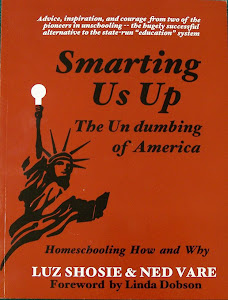“To the extent that producers are able to avoid competition, consumers suffer from the absence of innovation.” – Myron Lieberman, Public School: An Autopsy
The School Wars are, in effect, Producer-Consumer Conflicts. The conflicts arise when producers charge high prices for low quality services or products. The conflicts are common when the producer is a government owned and run monopoly as public schools are. It is ironic that the “public schools” are not owned or run by the public, but by the government, while private schools are owned and run by members of the public.
Most people are both producers and consumers. As consumers, we want improvement in what we buy, whether better quality, lower price or easier accessibility. Such improvements are the result of competition (market forces) among many producers of the products and services we want. But as producers, we try to protect ourselves from competition that would threaten our livelihood. The best situation, then, would be to have a monopoly as a producer and competition as a consumer.
In government schooling, the producers are the state, the school boards, administrators, teachers, and the consumers are the children, parents and taxpayers. The producers have advantages over the hapless consumers -- they have a virtual monopoly with constant income while the consumers must take what they are offered, and pay for it. Unfortunately, it is an inferior product at a high price. The producers determine the product and set the price without regard to market forces. They enjoy guaranteed revenue from taxes regardless of the quality of their product. They have the public over a barrel.
In a town such as mine (Guilford, CT) where there is no private school to offer competition, the school system can, and does, ignore its consumers simply because no market forces are operating. In the face of parental concerns, the administrators get away with remarks such as, “Trust us, we’re professionals” and, “You have no background in education.” Their intent is simply to dismiss parents for meddling in their private kingdom or for being a threat to their control. Their tactic is denial.
What are a few of the potential conflicts? Parents want the administrators to find the best teachers regardless of credentials. Parents also want teachers either to have a major in the subject they teach or to pass a rigorous test on the material. Unfortunately, the teacher unions insist on "certification" even though the certification process does not attract the best people for the jobs available. In fact, the process is repugnant to well-qualified and high-achieving adults.
The unions also fight against testing of its members for their knowledge and/or competence. School boards always agree with the unions. Who speaks for the consumers? No one.
Another conflict exists over merit pay. Most parents accept the free market idea that offers rewards based on achievement and accomplishment. It is a given in the real world that higher productivity gets higher pay…that is the incentive for doing more and better work. If applied to teachers, it would mean that some teachers would be paid more than others based on student achievement. Yet, the unions resist those market-oriented concepts and insist on equal pay based mostly on tenure. Thus teacher salaries are one-size-fits-all for the convenience of school administrators and so that the union can avoid internal squabbles. Nowhere is there a concern for what would be best for children, parents or community.
Many citizens believe that with more taxes or a redistribution of money the schools will work as parents want. However, no matter how much of our money government schools spend, they will not do what parents want. Why? Because the system is designed by government central planners advised by teacher unions. It serves the state, not parents, and its purpose is to turn out a mass of docile employees, not self-governing creative questioning individuals.
Subscribe to:
Post Comments (Atom)


1 comment:
In regards to merit pay..."If applied to teachers, it would mean that some teachers would be paid more than others based on student achievement."
I totally support this, because as a public school teacher in NJ, I can easily get a raise, by handing out "A" grades. :) (sorry for the sarcasm)
The point is, how would one police this???? If your answer means giving more standardized tests (on top of the one's students already take in NJ) and then scale them to determine merit pay, then what has been created is a philosophy called "teaching to the test".
The goal is to get our students to think on their own, to think critically, to become productive decision makers and learners, and to get a background in a Liberal Arts education. AND not to be molded for a single test as this would be the incentive for the teacher.
Once you institute merit pay, you've opened the door to a system that in the end will only hurt the students and ultimately the public school system.
Post a Comment